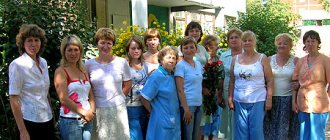Notes and plans for parent meetings
Contained in sections:
- Working with parents. Interaction with families 11856
Includes sections:
- Gender education. Parent meetings 42
- Final parent meetings 449
- Master classes for parents 3290
- Traffic rules Parent meetings 337
- Minutes of parent meetings in kindergarten 485
- Parent meeting at the beginning of the year, introduction 288
By groups:
- Senior group
- Preparatory group
- Middle group
- Junior group
Showing publications 1-10 of 14800. All sections | Parent meetings in kindergarten
New
Photo
The best
Master class for parents “Use of mnemonics in the development of speech of preschool children” Master class for parents “Use of mnemonics in the development of speech of preschool children”
Goal: to introduce
parents to the method of mnemonics as a way to develop speech, memory and thinking of preschoolers, ensuring effective memorization, preservation and reproduction...
Master class on modeling salt dough for children, parents, teachers “Christmas tree made from salt dough”
Master class for children, parents and educators “Christmas tree made from salt dough”
Author: Mishina Anna Anatolyevna, teacher of the State Budget Educational Institution
“
Kindergarten No. 2 ” Kolpinsky district, St. Petersburg Description: the master class is intended for preschool children,
parents , educators….
Guidelines for preparing for parent-teacher meetings
Olga Lapina
Guidelines for preparing for parent-teacher meetings
Methodological recommendations for preparation and conduct
parent meeting
1. The meeting is organized and held at least once a quarter.
2. The meeting must begin at a strictly established time. Parents get used to this requirement and try not to linger.
3. Maximum duration – 1-1.5 hours (60 minutes with parents and 20 minutes with children)
.
4. At the beginning of the school year, at the first meeting with parents , it is important to determine the day of the week, time and agree on the topic of meetings for the school year (who they would like to meet with, whose advice to receive)
.
This can be found out by surveying parents .
A joint work plan for the academic year is approved. 5. Conducting a parent meeting requires careful preparation , a kind of scenario, only in this case it will take place in an atmosphere of interest, with the active participation of parents . Assistance in preparing and holding the meeting can be provided by the parent committee of the group or individual active parents .
6. As a rule, a parent meeting consists of two parts: general (conversation, analysis of a specific situation, planning, discussion, etc.)
and individual
(at the request of
parents ) .
Usually these are consultations with the participation of several parents on issues of interest to them.
7. The main method of conducting a meeting should be dialogue . Only he will provide an opportunity to listen and discuss other opinions and proposals.
8. Elements of communication can be verbal and non-verbal. The impression of a person is made up of many of his diverse traits. To a large extent, it depends on a person’s ability to communicate non-verbally (voice intonation and timbre; maintaining a distance separating speakers; posture; gestures; facial expression; eye contact; manners, clothing style, etc.).
9. When communicating with parents , it is especially important for the teacher to pay attention to certain non-verbal moments that show the attitude of the participants in the parent meeting . This may include nervous behavior, tense silence, expressive gestures or exclamations, eye contact or lack thereof, etc.
10. When preparing for the meeting , the teacher can ask parents in advance to fill out questionnaires that will help them get a more specific idea of the issue that is proposed to be discussed at the parent meeting .
The main stages of preparing a parent meeting
1. Selecting a meeting .
2. Determining the goals of the parent meeting .
3. Determining the type, form, stages of holding a parent meeting , methods and techniques for the joint work of its participants.
4. Study by educators and other organizers of the collection of scientific and methodological literature on the problem under consideration.
5. Development of a meeting .
6. Distribution of training .
7. Conducting a micro-study in the community of children and parents .
8. Inviting parents and other meeting .
9. Production of original memos with advice, posters on the topic of the meeting .
10. Preparation of competitions on the theme of the meeting.
11. Preparation of exhibitions on the theme of the meeting.
12. Audio recording, video recording of children’s answers on the topic of the meeting .
13. Development of a draft meeting , recommendations , instructions to parents .
14. Conducting a meeting of the parent committee (as necessary)
.
15. Equipment and design of the venue for the parent meeting .
Main stages
parent meeting
1. Opening speech by the presenter. Identification of the topic, problem.
2.Theoretical part:
• Analysis of micro-study results;
• Pedagogical comprehensive education (speech on the topic of the meeting )
;
• Discussion of the problem by parents ;
• Analysis by the teacher of the results of work with children on the topic of the meeting ;
3.Practical part:
• Performing practical (creative)
assignments by all
parents ;
• Collaboration between parents and children (open viewing)
;
4. Final part. Reflection. Decision-making.
Target:
Create conditions for parents to get to know each other. Inform parents about the content of the kindergarten, introduce them to the content of the educational activities of the preschool, the tasks of development and upbringing of children.
Progress of the parent meeting
Arrival of parents: upon registration, parents are given a blank sheet of paper so that they can ask questions about what they want to know about the dow, filling out questionnaires.
1. Introduction
Head: Good evening, dear parents! I am glad to see you in our kindergarten. I understand how exciting this moment is for you. however, the moment of our meeting is also characterized by the fact that not only you and your children are worried, but, I honestly admit, both I and our entire team are worried.
Now a lot will change in the lives of your children. There will be new faces next to them, adults and children; they will need to learn to live in a group, accept and follow certain rules.
It is very important that you, loving parents, are close to your children. You and I need to join forces to ensure that children are interested and comfortable in kindergarten, and here it is very important to have mutual understanding and support. You and I will live alone for 5 years, we hope to be a friendly family. We have to rejoice and overcome difficulties together, grow up and learn.
Raise one palm up
Tell me, can you make a clap with one palm? Yes, indeed, you need a second palm. The clap is the result of the action of two palms. Dou teachers are just one palm. And no matter how strong, creative and wise she is, without a second palm (and it is in your face, dear parents), the teacher is powerless.
From this we can derive the first rule:
- only together, all together, we will overcome all difficulties during the most important period for your child, the period of adaptation to kindergarten.
I give the floor to the teacher and psychologist of our kindergarten.
Topic: “Child’s adaptation to dow”
Enrolling a child in kindergarten is the first step into independent life, which is not easy for all children.
Our task is to do so. So that the adaptation period passes painlessly for the child. Every child sooner or later has to socialize, that is, becomes able to live among other people. This is a necessary stage for everyone.
Adaptation is the adaptation of the body to changing external conditions. This process requires a lot of mental energy and often takes place with tension.
Already from the first days of a child’s life, habits, attachments, and certain behavior are formed in the family. By 2-3 years the stereotype becomes quite stable. Of course, you are very worried about how he will react to the changes in his life. What real problems you and your baby may have to face and how to make the adaptation process smoother
Question to parents: Who adapts easier?
- For children. Whose parents prepared them for visiting the kindergarten in advance. A few months before this event (this means that parents read fairy tales about kindergarten, walked near the garden...)
— Children who are physically healthy, that is, without chronic diseases (during this period, all the child’s forces are tense, and can be directed towards getting used to the garden, without wasting time fighting the disease)
— Children who have independent skills (there is no need to waste the child’s energy on learning everything necessary)
— Children whose regime is close to the kindergarten regime (this is the daily routine, sleep, nutrition)
— Children whose diet is close to the garden.
Call on a fairy tale or game to help.
You can come up with a fairy tale about how the bear went into the garden. How he liked it there, at first it was uncomfortable and a little scary, but he made friends with the children and the teacher. You can play this fairy tale with toys. And the key point in it is the return of the mother for the child. Do not interrupt the story under any circumstances. Until that moment comes.
Parents and children are most upset in the morning when they separate. Here are some tips.
- Speak confidently to your child both at home and in the garden. Calmly.
- Let the child be taken away by the parent or relative with whom it is easier for him to leave.
- Be sure to say that you will come and indicate when.
— You should have your own farewell ritual, after which you leave confidently.
Entering kindergarten is the moment when mother and child separate, and this is a test for both. Mom’s heart also breaks when she sees how her baby is going through
- Believe that the baby is not a “weak” creature at all.
The child’s adaptation system is strong enough to withstand this test. It’s paradoxical, but it’s good that the baby is crying. Believe me, he is in real grief. Crying is an assistant to the nervous system; it prevents it from being overloaded. Therefore, do not be afraid of a child’s crying, do not be angry with a child for whining.
- you can’t be scared by kindergarten
— you can’t speak badly about teachers or the kindergarten in front of your child
Take a walk with your child around the nursery area, ask about his experiences.
Signs of a child’s readiness for kindergarten: the baby may be left without parents, easily meets peers and adults, and shows interest.
Get used to the daily routine
Teach self-care skills
In the first days you can spend time with your child
The main thing to remember is that this is your baby. Spend more time with him now.
A necessary condition for successful adaptation is the coordination of the actions of parents and educators.
Don’t be sad, this had to happen someday, your chick is gradually spreading its wings and trying to fly out of its mother’s warm, soft nest!
You can read more detailed information in our brochures
(We distribute booklets)
Head: And now, dear parents, we offer you
- Take everything one flower at a time. Color them. (On the tables there are flowers of the same size, color, shape, colored pencils, felt-tip pens.) Now compare your flower with the flowers of your neighbors. All the flowers were the same in size, color, and shape. Tell me, after you have painted a flower, can you find two completely identical flowers? (No.) We, adults, UNDER THE SAME CONDITIONS, do everything differently. Children will also react differently to new circumstances and conditions.
Hence our second rule:
- never compare your child with others! There is no one or something better or worse. There is OTHER! Different character, temperament, receptivity, sensitivity of the child and changes in the surrounding reality.
And our teachers will tell you about the features of educational activities and life in our kindergarten, and you listen carefully, write down if necessary.
— I give the floor to the senior kindergarten teacher.
— The floor is given to the kindergarten physical education instructor.
— The floor is given to the music director of the kindergarten.
— The floor is given to the group teacher.
— The floor is given to the group teachers.
Hence the third rule:
“Only with the consent of adults, their mutual understanding and support, can high results be achieved.
But before the baby crosses the threshold of a new home, a home of cheerful children, you and I will need to solve a number of small formalities:
I give the floor to the clerk:
Our preschool operates on a five-day work week from 7.00 to 19.00 with weekends and holidays.
Documents will be accepted in the following order:
The application is accepted by the head of the preschool educational institution,
I carry out the registration of a personal file for the child and the collection of a package of documents for the provision of compensation for part of the child’s maintenance fee. Clerk's office.
List of documents: a memo for parents is distributed.
Manager:
Review information of statutory documents, local acts, work of bodies regulating the main activities of dows.
In order for every day to be exciting for a child, filled with vivid impressions, the surrounding environment plays an important role; the brighter and more comfortable it is, the calmer, more comfortable each day will be.
And now you and your teachers will go to the group for further acquaintance and communication.
Thank you! We are waiting for your treasure.




